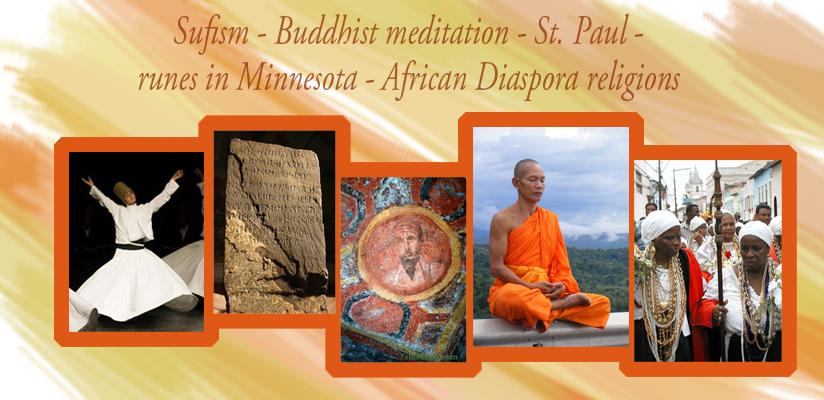Religious Studies course offerings for spring cover a broad spectrum from ethics to religion in America, religion and healing, and Islamic philosophical thought.
For Spring 2017, Religious Studies will be putting up three online courses, available across both the Columbia campus and the branch campuses around the state.
Katja Vehlow has created two online courses. About her RELG 101-J10 Exploring Religions she says that “Through case studies we will look at runes in Minnesota, Islam, and Scientology, among others.” In RELG 205 Ethics, Morality & Religion the focus will be on the relationship between religion, ethics, and social responsibility and will examine specific kinds of religious practices through which ideas about values and ethics are developed, prioritized, contested, adapted, and transmitted.
Scott Reeves’ online course RELG 204 Religion in America will look at “various expressions of major world traditions as practiced in the US as well as home grown faiths such as Mormonism looking at the commonalities between them and perhaps allow the historic world traditions to critique that essentially American element.”
Among the traditional classroom courses for this spring term, two interesting courses with a focus on Asia will be taught by Elon Goldstein. RELG 221 Buddhist Meditation-Theory & Practice will examine techniques of Buddhist meditation from varied traditions including Zen, tantra, and so-called "insight meditation" along with their ongoing influences upon key areas of modern life. His second course RELG 352 Religions of East Asia explores fascinating facets of Daoist, Confucian, Buddhist, and other popular traditions from China, Korea, and Japan.
Our visiting scholar in Islamic Studies, Noah Gardiner, offers a special opportunity for students to take courses in Islamic theology and philosophical thought as well as in the mystical tradition of Sufism. (RELG 359 Islamic Theology & Philosophical Thought and RELG 367 Sufism)
Erin Roberts is teaching RELG 312 Life and Letters of Paul along with a classroom section of RELG 205 Ethics, Morality, and Religion. The course on Paul will cover not only ancient accounts of Paul’s life, but also 2nd century texts as well as texts found among the Nag Hammadi Codices in 1945. Her course on ethics, morality and religion will address the convergence of religion and the development of values, ethics, and social responsibility, examining the costs and benefits of equating religious practice with moral/ethical practice.
Scott Reeves and Noah Gardiner will each also be offering classroom sections of RELG 101 Exploring Religions. – Reeves’ RELG 101-002 takes the approach that “people are essentially religious; whether we take religion to be a transcendent glimpse into some ultimate reality or a chemical glitch in the human brain, the ubiquity of religious belief and experience is a reality that has impacted every human life. – Gardiner’s RELG 101-001 will focus on “the Book” in various religious traditions, with particular attention to ancient Egyptian religion, Islam, Hinduism, and The Church of Jesus Christ of Latter-day Saints (Mormonism), exploring origins, histories, and central tenets with an eye to the roles that various kinds of books have played.
Stephanie Mitchem is teaching her course in Religions, Medicine & Healing (RELG 473) which addresses the interactive and challenging relationships between religions, medicines, healing and cultures in this growing field in Religious Studies. Her second course will be RELG 343 Religions of the African Diaspora which is cross listed with AFAM 343 for students in both majors to apply it toward their respective BA degrees. This course is designed to explore the development and theologies of African and African Diaspora religions; examine misunderstandings; and arrive at a more sophisticated and nuanced vision of these religions and the people who hold them.
